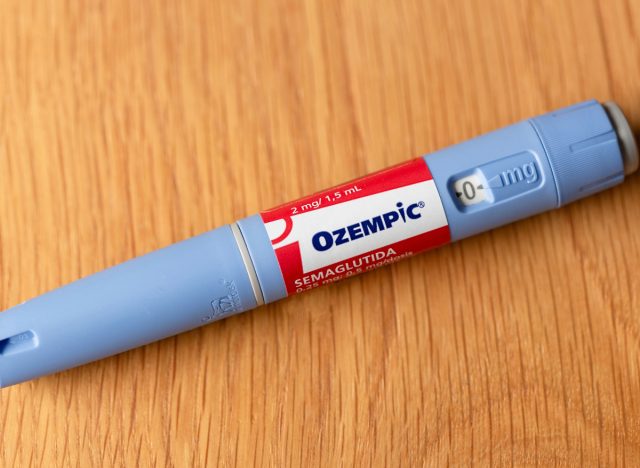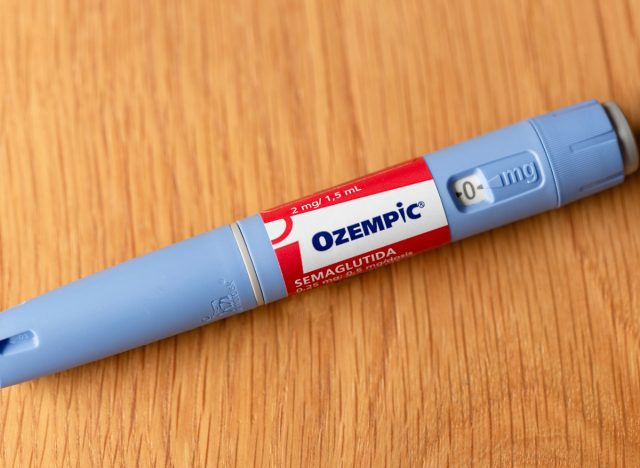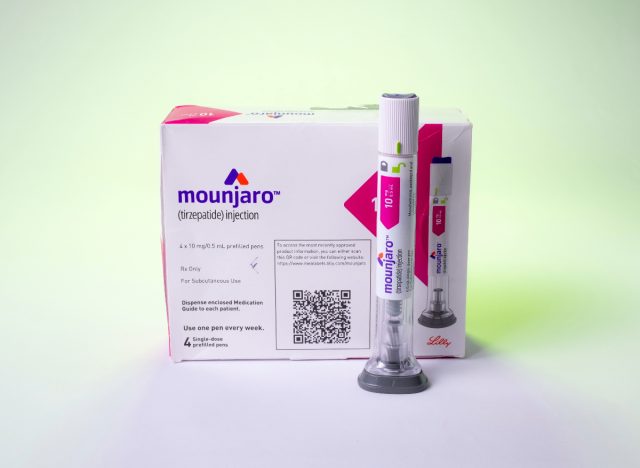Ozempic vs. Wegovy vs. Mounjaro: What’s the Difference?

By now, you’ve likely heard the chatter surrounding diabetes “weight loss drugs” that are circulating the internet. According to Page Six, celebs such as Elon Musk, Amy Schumer, and Chelsea Handler have even admitted to taking Ozempic at one point or another for various reasons. But are these diabetes/weight loss drugs safe? And how do Ozempic, Wegovy, and Mounjaro, for instance, compare when it comes to weight loss? To sift through the noise, we spoke with Gregory Lopez, MA, PharmD, research lead for Examine.com with a Master’s degree in molecular biophysics from Johns Hopkins. Lopez breaks down each drug, along with which one may be best for weight loss.
If you’re ready to hear more, keep reading. And when you’re finished learning all about Ozempic, Wegovy, and Mounjaro, be sure to check out Berberine Is Being Hailed as ‘Nature’s Ozempic’—But Does it Really Work for Weight Loss?
What is Ozempic?

Ozempic is one of the brand names for the antidiabetic medication, semaglutide. “It was approved by the FDA in 2017 for people with diabetes to help control blood sugar,” Lopez explains. “Its ability to help people lose weight was a bit of a fortuitous accident […] the main focus of Ozempic was diabetes, but it is useful for both diabetes and weight loss and can be used for either.”
As far as cost is concerned, Ozempic can run approximately over $1,000 per month, according to WebMD. Note that the majority of insurance companies will only cover this drug if it’s prescribed for the treatment of type-2 diabetes, not weight loss.
What is Wegovy?

The story doesn’t end at Ozempic! Soon after the FDA approved Ozempic to be used to treat diabetes, the manufacturer of Ozempic—Novo Nordisk—began researching its weight loss benefits, Lopez tells us. “This ultimately led to the FDA approving the same exact drug […] at a slightly higher dose for weight loss, just under a different name: Wegovy,” Lopez continues. “These are both the exact same active drug: semaglutide. They just have different brand names and Wegovy’s maximum recommended dose is a little bit higher since higher doses are better for weight loss, while slightly lower doses are fine for diabetes management.”
Lopez put things into layman’s terms: A 14-inch pizza and a 16-inch pizza are the same meal; there’s just more of the 16-inch one. “Same thing with Wegovy and Ozempic: Wegovy is the same thing as Ozempic—there’s just more of it, at least at the maximum dosage,” Lopez points out.
Wegovy slows down digestion while lowering your food intake. “In other words, you feel more full while also experiencing reduced food cravings,” Lopez explains. When it comes to cost, WebMD notes that Wegovy can cost approximately $1,300 each month, and insurance companies don’t typically cover the cost.
What is Mounjaro?

The third weight loss drug we’re talking about today is Mounjaro. Lopez tells us, “Mounjaro is the brand name for a new drug whose generic name is tirzepatide. It was approved in 2022 to help lower blood sugar in people with diabetes. The FDA has granted it ‘Fast Track’ status, and it’s on its way to being approved for weight loss soon. Despite that, Mounjaro is already being used off-label for weight loss, with a number of celebrities using it in recent months.”
Mounjaro is typically only covered by insurance when used to treat type-2 diabetes. If you’re not using insurance, Mounjaro can run anywhere between approximately $1,000 to $1,200 each month.
How do Ozempic, Wegovy, and Mounjaro compare?
As Lopez previously noted, Ozempic and Wegovy “are the exact same drug whose generic name is semaglutide.” Considering the fact that they are the same exact chemical, they have the same function, which is to imitate a natural hormone—GLP-1—that’s released in your body to slow digestion, lower appetite and cravings, and help you get a handle on blood sugar. “Mounjaro is a drug that also mimics GLP-1. But it mimics one other natural hormone as well: GIP,” Lopez adds.
All three of these drugs can help maintain blood sugar in diabetic individuals as well as helping them lose weight. Their side effects are also similar, which can include changes in stool (constipation or diarrhea), stomach pain, and nausea. The price is also comparable for all three of these diabetes/weight loss drugs.
Which is the most beneficial for weight loss?
Drumroll, please! Lopez explains that according to recent data, Mounjaro seems to be the best choice overall for weight loss, with Wegovy and Ozempic coming in next. “Remember that Wegovy and Ozempic are the same thing; any difference between the two comes down to a difference in dosing,” Lopez says.
If you’re concerned about your weight from a health standpoint, it’s always advisable to speak with a healthcare professional—especially if you’re curious about taking one of these drugs. Your doctor will know if it’s the best course—or even an option—for you.
Alexa Mellardo





